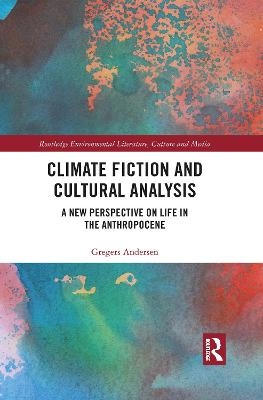
Climate Fiction and Cultural Analysis
Routledge (Verlag)
978-1-032-08879-2 (ISBN)
Climate Fiction and Cultural Analysis argues that the popularity of the term "climate fiction" has paradoxically exhausted the term’s descriptive power and that it has developed into a black box containing all kinds of fictions which depict climatic events and has consequently lost its true significance.
Aware of the prospect of ecological collapse as well as our apparent inability to avert it, we face geophysical changes of drastic proportions that severely challenge our ability to imagine the consequences. This book argues that this crisis of imagination can be partly relieved by climate fiction, which may help us comprehend the potential impact of the crisis we are facing. Strictly assigning "climate fiction" to fictions that incorporate the climatological paradigm of anthropogenic global warming into their plots, this book sets out to salvage the term’s speculative quality. It argues that climate fiction should be regarded as no less than a vital supplement to climate science, because climate fiction makes visible and conceivable future modes of existence within worlds not only deemed likely by science, but which are scientifically anticipated.
Focusing primarily on English and German language fictions, Climate Fiction and Cultural Analysis shows how Western climate fiction sketches various affective and cognitive relations to the world in its utilization of a small number of recurring imaginaries, or imagination forms.
This book will be of great interest to students and scholars of ecocriticism, the environmental humanities, and literary and culture studies more generally.
Gregers Andersen is a postdoctoral researcher in environmental humanities at the Department of English, Stockholm University. He has published articles in several international journals on how literature, films, cultural theory, and philosophy can shed light upon human and non-human conditions in the Anthropocene.
Acknowledgements
Introduction: The Birth of a New Type of Fiction
A Brief History of Global Warming
What is Climate Fiction?
The Context of this Book
Presentation of Content
Chapter 1: Cultural Hermeneutics
Hermeneutics and Preunderstanding
Approaching Climate Fiction
Chapter 2: The Social Collapse
From the Broken Social Contract to Climate War
Post-apocalyptic Worlds
The Uncanny as a Mood
The Uncanny Relation to the World
Chapter 3: The Judgment
The Judgment in Cultural History
The Judgment in Climate Fiction
Serres, Latour, and the Imagination Form
Another Uncanny Relation to the World
The Judgment as a Denial of Responsibility
Chapter 4: The Conspiracy
The Conspiracy in Cultural History
Doomsday Atmospheres
The Arrival of the Super Computer
Crichton and The Conspiracy
The Suspicious Relation to the World
Chapter 5: The Loss of Wilderness
The Loss of Wilderness in Cultural History
The Destructiveness of Humanity
Another Suicidal Ice Lover
Heidegger and the Imagination Form
The Loving Relation to the World
Chapter 6: The Sphere
The Sphere in Cultural History
Bubbles
The Globe
Sloterdijk and the Imagination Form
The Anthropotechnical Relation to the World
Chapter 7: The Birth of a New Perspective
Beyond the Grid of the Imagination Forms
Two Functions of Climate Fiction
Bibliography
| Erscheinungsdatum | 01.07.2021 |
|---|---|
| Reihe/Serie | Routledge Environmental Literature, Culture and Media |
| Verlagsort | London |
| Sprache | englisch |
| Maße | 156 x 234 mm |
| Gewicht | 240 g |
| Themenwelt | Geisteswissenschaften ► Sprach- / Literaturwissenschaft ► Anglistik / Amerikanistik |
| Geisteswissenschaften ► Sprach- / Literaturwissenschaft ► Literaturwissenschaft | |
| ISBN-10 | 1-032-08879-6 / 1032088796 |
| ISBN-13 | 978-1-032-08879-2 / 9781032088792 |
| Zustand | Neuware |
| Haben Sie eine Frage zum Produkt? |
aus dem Bereich


